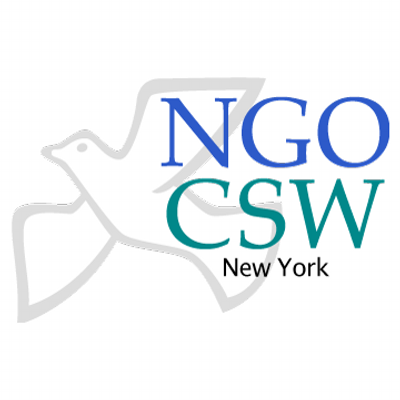Marcela Fuentes has a Master of Science in International Affairs from Seton Hall University, a Master’s Degree in Law from Pennsylvania State University, and worked as an attorney in Ecuador. She is experienced in immigration and humanitarian aid, international humanitarian work, and family law. Along with two current Seton Hall University students, she worked as a volunteer with NGO Commission on the Status of Women this year. Her reflections on NGO CSW are below.
The charm of New York is not only due to its monuments, its diversity, and trade, it is also the headquarters of the United Nations. This organization, apart from paralyzing New York in September at its well-known annual session of the General Assembly, also imposes other rhythms throughout the entire year. One of them is the annual session of the Commission on the Status of Women (CSW), which is the world’s leading intergovernmental body for the promotion of gender equality and the empowerment of women. Among its main tasks are the systematization of the situation of women in the world, the establishment of standards for gender equality, and the empowerment of women.
Thus, for approximately ten days each March, New York becomes one of the capitals of gender equality and women’s empowerment. On the one hand, the CSW meets in an official manner, in which representatives of Member States, United Nations agencies and Non-Governmental Organizations (NGOs) in consultative status with ECOSOC evaluate the global efforts made to achieve gender equality, and the empowerment of women, which are called official meetings of the CSW. Second, in addition to these meetings, there are countless activities that take place in parallel to the CSW. For instance, there are side events are organized by the Permanent Missions and UN agencies, in which concerns related to the CSW and other critical issues are discussed. Finally, the NGO/CSW Forum and its Parallel Events are organized by an association of NGOs working on the subject, which take place outside the United Nations Headquarters but in nearby locations. Approximately 4000 women representatives from all over the world and from different political, socioeconomic, and technical levels gathered in New York from March 11 to 22 to share their experiences, evaluate national policies, and learn about experiences that enrich their work with and for women.
Thereby, this year the CSW63 Forum took place in order to analyze the social protection systems, access to public services and sustainable infrastructure for gender equality and the empowerment of women and girls. In addition, the CSW reviewed the conclusions agreed at the sixtieth meeting, which were related to the empowerment of women and sustainable development. The main lines of work that were agreed upon were: 1) Strengthen normative, legal and policy frameworks. 2) Strengthen women’s and girls’ access to social protection. 3) Strengthen access to public services for women and girls. 4) Make infrastructure work for women and girls. 5) Mobilize resources, strengthen women’s participation and improve evidence. Since 1946, the CSW has become the axis that leads the main debates on the issues that affect women and girls to achieve gender equality and their empowerment. This year, the main driver of the evaluation was social protection systems.
However, no less important were the parallel meetings held by the NGO/CSW63, which took place in 4 venues with approximately 60 daily events. In them, women from different nationalities, social and economic status, languages and realities shared their projects that they are working on, expressed the problems and challenges they face in their countries, and found solutions through the constructive dialogue. For instance, when we talk about health systems, even in developing countries, one of the problems is the detection of diseases in minorities. Lack of education, limited access to health services, and access to work are the factors that increase the mortality of minority women and girls. Moreover, the lack of a national health policy that mainstreams gender and establishes gender-responsive assessment measures contributes to the the prevalence of diseases. Nonetheless, education and access to work are seen as preventative measures; in particular, literacy is fundamental to prevent diseases. With more than five hundred events, not only the concerns but also the solutions multiplied in favor of changing social protections systems that are inaccessible or irresponsive to women. The wealth that these events organized by civil society were not only limited to the technical aspects, but networking was also another of the objectives that these women seek to cooperate in this systemic change.
Further Reading
“CSW63 (2019).” UN Women.
“Session Outcomes | Commission on the Status of Women: 63rd Session (11–22 March 2019).” UN Women.
